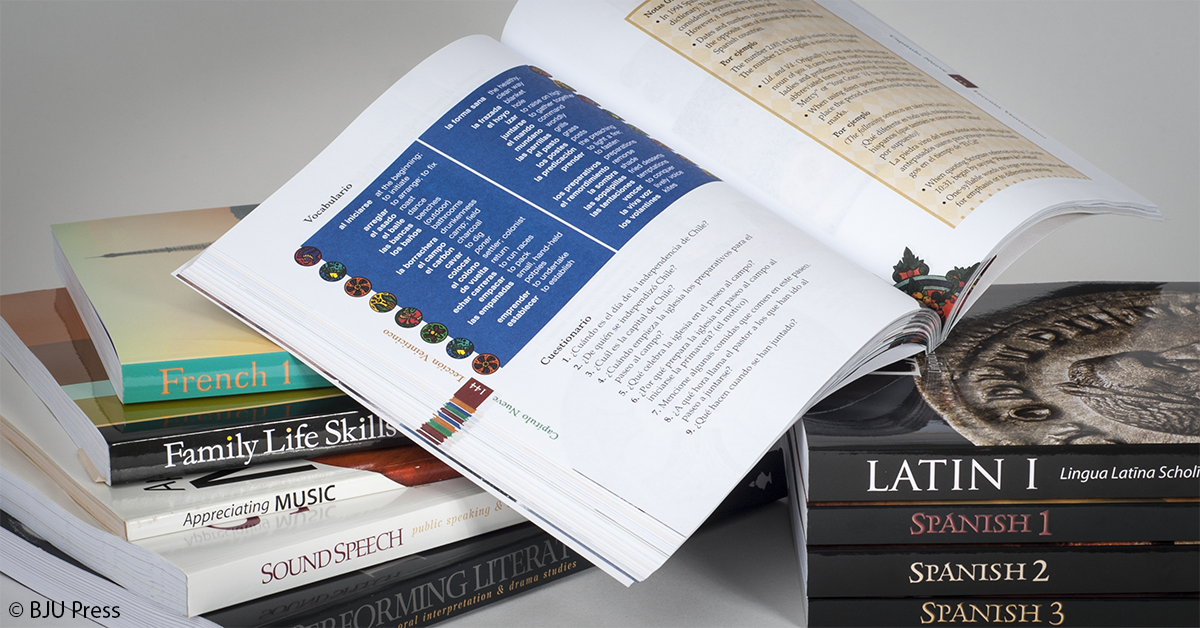
You’ve chosen to educate your children at home to protect them from secular influences during their formative years. But what about the books we bring into our homes? Sometimes a book’s agenda is obvious—you can tell by what authors put in or what they leave out. I recently surveyed a selection of secular textbooks and found the following topics of concern: the acceptance of evolution as scientific fact, the glorification of pop culture icons such as humanist authors and fierce feminists, and the affirmation of extreme environmentalism. These are obvious, but many books just leave God out, which is at the foundation of secular thought. So what can we do to protect our children from textbooks packed with secular philosophies?
Here are five ways Christian textbooks can support your goal of teaching your children to think biblically.
1. Redeeming the Minds of Our Children
As Christian parents, we want to redeem our children’s minds for God’s glory. We want them to acknowledge that “in Him we live, and move, and have our being” (Acts 17:28), and that whatever is done must be done “heartily, as to the Lord” (Colossians 3:23). To achieve that goal, we need Christian textbooks—books that do more than merely purport to have a “moral emphasis” or tack a Bible verse onto the title page. A thoroughly Christian textbook helps a parent to support the spiritual growth of the child and to equip that student for God’s service.
2. Reaffirming a Biblical Worldview
A genuinely Christian textbook promotes a biblical worldview. For example, when discussing the women’s rights movement of the ’70s, a Christian history text factually discusses the positive and negative outcomes of the movement, basing its analysis of the movement on Scripture. In a secular book, students often encounter statements that deny God as Creator, such as “millions of years ago” or “before civilization got started.” Using a Christian text, a parent can spend time actually teaching, rather than un-teaching the errors.
3. Putting God Back into the Textbooks
Sometimes the danger lies in omission. One secular science textbook discusses babies and bees and rainbows but never mentions the God who made them all (Genesis 1:1; John 1:1–3). Daily bombarded with humanism, materialism, hedonism, and socialism, a student may begin to think, “God can’t be too important since He isn’t mentioned anywhere in this scholarly work.” Christian textbooks can effectively combat this God-omitting worldview.
4. Teaching Children How to Live Right
Christian textbooks emphasize the characteristics of God and principles of godly living. They reveal God in every branch of study. A writing textbook reflects a God of creativity and beauty, a science book reflects a God of infinity and order, and a Christian history text showcases events planned by an omniscient, omnipotent God. Students understand the conflict between righteousness and unrighteousness, explore real-life examples of the principles of sowing and reaping, and see illustrations of the providence of God.
5. Training Students to Think for Themselves
Christian textbooks further support and equip Christian students by encouraging discernment and teaching them to analyze content using biblical principles. For example, in one Christian literature text, students are asked to compare and contrast Geoffrey Chaucer’s Canterbury Tales with various biblical accounts. The textbook also evaluates the advice of Sir Francis Bacon’s essays in light of God’s Word.
Choosing Hope for the Next Generation
How can we fight the philosophies that stunt our children’s spiritual growth and the secular texts that cram their minds full of the world’s wisdom? With God’s help, we can use Christian texts to give our children access to a higher wisdom. There is still only “one God, and one mediator between God and men, the man Christ Jesus; who gave himself a ransom for all” (1 Timothy 2:5–6). Christ remains the ultimate answer—our one true Hope. Why use a textbook that undermines that Hope, subtly or not?
• • • • •
A word-lover and grammar enthusiast, Kim Stegall writes for WORLDteen, a magazine published by WORLD. In her spare time, she serves as dramaturge for the Greenville Shakespeare Company, a local nonprofit theater. In addition to working on dozens of writing, grammar, and literature textbooks for BJU Press, she has written a number of plays and published two children’s books with JourneyForth: Mumsi Meets a Lion and Rodney Robbins and the Rainy-day Pond.